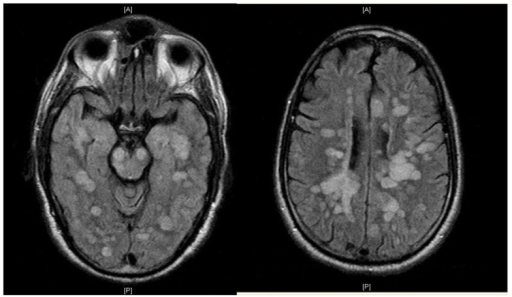Acute disseminated encephalomyelitis
(Redirected from AHL)
Editor-In-Chief: Prab R Tumpati, MD
Obesity, Sleep & Internal medicine
Founder, WikiMD Wellnesspedia &
W8MD medical weight loss NYC and sleep center NYC
| Acute disseminated encephalomyelitis | |
|---|---|

| |
| Synonyms | Post-infectious encephalomyelitis, post-vaccinal encephalomyelitis |
| Pronounce | N/A |
| Specialty | N/A |
| Symptoms | Fever, headache, nausea, vomiting, seizures, confusion, ataxia, vision problems |
| Complications | Seizures, coma, death |
| Onset | Rapid, often following an infection or vaccination |
| Duration | Days to weeks |
| Types | N/A |
| Causes | Often follows a viral infection or vaccination |
| Risks | Recent infection, vaccination, autoimmune disorders |
| Diagnosis | MRI, lumbar puncture, blood tests |
| Differential diagnosis | Multiple sclerosis, neuromyelitis optica, viral encephalitis |
| Prevention | N/A |
| Treatment | Corticosteroids, plasmapheresis, intravenous immunoglobulin |
| Medication | N/A |
| Prognosis | Generally good with treatment, but can vary |
| Frequency | Rare |
| Deaths | N/A |
Acute disseminated encephalomyelitis (ADEM) is an autoimmune disease marked by a sudden, widespread attack of inflammation in the brain and spinal cord. It is characterized by a brief but intense episode of inflammation in the central nervous system (CNS), often following a viral infection or vaccination.
Pathophysiology[edit | edit source]
ADEM is believed to be an autoimmune response where the body's immune system mistakenly attacks its own myelin, the protective covering of nerve fibers in the central nervous system. This results in demyelination, which disrupts the normal transmission of nerve impulses. The exact mechanism is not fully understood, but it is thought to involve molecular mimicry, where the immune system confuses myelin with viral antigens.
Clinical Presentation[edit | edit source]
Patients with ADEM typically present with a rapid onset of neurological symptoms such as headache, fever, nausea, and vomiting. Neurological deficits may include ataxia, hemiparesis, optic neuritis, and altered mental status. In severe cases, seizures and coma may occur.
Diagnosis[edit | edit source]
The diagnosis of ADEM is primarily clinical, supported by magnetic resonance imaging (MRI) findings. MRI typically shows multiple lesions in the white matter of the brain and spinal cord. These lesions are often bilateral and asymmetrical. Cerebrospinal fluid (CSF) analysis may show elevated protein levels and pleocytosis.
Treatment[edit | edit source]
The mainstay of treatment for ADEM is high-dose corticosteroids, such as methylprednisolone, to reduce inflammation and immune system activity. In cases where patients do not respond to steroids, intravenous immunoglobulin (IVIG) or plasmapheresis may be considered. Supportive care is also crucial to manage symptoms and prevent complications.
Prognosis[edit | edit source]
The prognosis for ADEM is generally favorable, with most patients experiencing significant recovery within weeks to months. However, some individuals may have residual neurological deficits. Recurrence is rare, distinguishing ADEM from multiple sclerosis, which is a chronic condition with recurrent episodes.
See also[edit | edit source]
Transform your life with W8MD's budget GLP1 injections from $125
W8MD offers a medical weight loss program NYC and a clinic to lose weight in Philadelphia. Our W8MD's physician supervised medical weight loss centers in NYC provides expert medical guidance, and offers telemedicine options for convenience.
Why choose W8MD?
- Comprehensive care with FDA-approved weight loss medications including:
- loss injections in NYC both generic and brand names:
- weight loss medications including Phentermine, Qsymia, Diethylpropion etc.
- Accept most insurances for visits or discounted self pay cost.
- Generic weight loss injections starting from just $125.00 for the starting dose
- In person weight loss NYC and telemedicine medical weight loss options in New York city available
- Budget GLP1 weight loss injections in NYC starting from $125.00 biweekly with insurance!
Book Your Appointment
Start your NYC weight loss journey today at our NYC medical weight loss, and Philadelphia medical weight loss Call (718)946-5500 for NY and 215 676 2334 for PA
Search WikiMD
Ad.Tired of being Overweight? Try W8MD's NYC physician weight loss.
Semaglutide (Ozempic / Wegovy and Tirzepatide (Mounjaro / Zepbound) available. Call 718 946 5500.
Advertise on WikiMD
|
WikiMD's Wellness Encyclopedia |
| Let Food Be Thy Medicine Medicine Thy Food - Hippocrates |
Translate this page: - East Asian
中文,
日本,
한국어,
South Asian
हिन्दी,
தமிழ்,
తెలుగు,
Urdu,
ಕನ್ನಡ,
Southeast Asian
Indonesian,
Vietnamese,
Thai,
မြန်မာဘာသာ,
বাংলা
European
español,
Deutsch,
français,
Greek,
português do Brasil,
polski,
română,
русский,
Nederlands,
norsk,
svenska,
suomi,
Italian
Middle Eastern & African
عربى,
Turkish,
Persian,
Hebrew,
Afrikaans,
isiZulu,
Kiswahili,
Other
Bulgarian,
Hungarian,
Czech,
Swedish,
മലയാളം,
मराठी,
ਪੰਜਾਬੀ,
ગુજરાતી,
Portuguese,
Ukrainian
Medical Disclaimer: WikiMD is not a substitute for professional medical advice. The information on WikiMD is provided as an information resource only, may be incorrect, outdated or misleading, and is not to be used or relied on for any diagnostic or treatment purposes. Please consult your health care provider before making any healthcare decisions or for guidance about a specific medical condition. WikiMD expressly disclaims responsibility, and shall have no liability, for any damages, loss, injury, or liability whatsoever suffered as a result of your reliance on the information contained in this site. By visiting this site you agree to the foregoing terms and conditions, which may from time to time be changed or supplemented by WikiMD. If you do not agree to the foregoing terms and conditions, you should not enter or use this site. See full disclaimer.
Credits:Most images are courtesy of Wikimedia commons, and templates, categories Wikipedia, licensed under CC BY SA or similar.
Contributors: Prab R. Tumpati, MD




